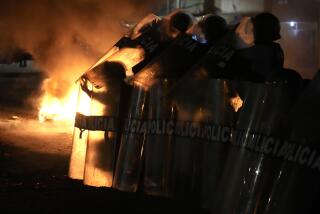U.N. Should Head Off Bloodshed, Panel Says
- Share via
WASHINGTON — An estimated 500,000 lives might have been saved in Rwanda if the U.N. had rushed 5,000 peacekeeping troops to that nation in 1994, a prominent international group has concluded in a sweeping report calling on nations to intensify their efforts to defuse murderous conflicts before they storm out of control.
The findings of the Carnegie Commission on Preventing Deadly Conflict could prove embarrassing to the Clinton administration, since Secretary of State Madeleine Albright, in her former post as the U.S. ambassador to the United Nations, was the strongest voice urging a delay in the dispatch of U.N. troops to Rwanda after it erupted into genocidal violence.
But the commission--set up and sponsored by the Carnegie Corp., a private foundation that focuses its research on issues of war and peace--was less interested in apportioning blame for what happened in Rwanda than in outlining a program to prevent similar bloodshed elsewhere.
Its report, to be released Monday, calls for creating “a culture of prevention” as well as forming a standing U.N. rapid-reaction force of 5,000 to 10,000 troops that could be deployed to countries in the early stages of a conflict.
“Preventing deadly conflict is possible,” the commission says. “The problem is not that we do not know about incipient and large-scale violence. It is that we often do not act.”
The report goes on: “Taught in . . . schools, emphasized by the media, pursued vigorously by the U.N. and other international organizations, the prevention of deadly conflict must become a commonplace of daily life and part of a global cultural heritage passed down from generation to generation.”
The United States has opposed formation of the type of rapid-reaction force proposed by the commission, fearing it would give the U.N. secretary-general too much power. But the commission says that, under its proposal, the force could not be sent anywhere without Security Council approval. And the U.S., as a permanent council member, could veto any deployment.
The commission--whose 16 members included former Secretary of State Cyrus R. Vance, former Norwegian Prime Minister Gro Harlem Brundtland and former foreign ministers from Britain, Australia, Canada, Uganda, Guyana and Pakistan--cites the Rwanda case briefly, promising a more detailed study later.
But the report makes clear that the commissioners believe that a U.N. rapid-reaction force could have prevented the mass killings of ethnic Tutsis in Rwanda in 1994.
Maj. Gen. Romeo Dallaire of Canada, who commanded a dwindling force of 2,500 U.N. peacekeeping troops during the Rwandan troubles, has long maintained that “a capable force inserted within two weeks . . . could have stopped much of the killing and removed the pretext for the continuation of the civil war” between the government (dominated by the Hutu people) and the rebels (dominated by the Tutsi people).
The commission, which convened an international panel of military leaders to assess Dallaire’s contention, says “the panel generally agreed that early military intervention--within two weeks of the initial violence--by a force of 5,000 could have made a significant difference in the level of violence in Rwanda and that there was a window of opportunity for the employment of this force” in April 1994.
If such a force had been “properly trained, equipped and supported,” the commission concludes, “it is likely [the troops] could have averted the slaughter of [the estimated] half-million people” who died in three months of civil war.
The administration’s reluctance to support U.N. peacekeeping in Rwanda came from its experience in Somalia six months earlier, when 18 American troops died while trying to capture a warlord. That debacle persuaded President Clinton that the United States must not engage in any such operation unless its mission is clearly defined and has a definite exit date.
But even if Washington had backed a swift peacekeeper deployment to Rwanda, it is unlikely the U.N. could have sent troops there as quickly as the commission proposes. The U.N. does not have a rapid-reaction force, and it takes officials months to assemble such a mission.
The commission says governments, working through the Security Council, must be prepared to use force if diplomacy or economic sanctions fail to prevent violent conflict.
“‘States--particularly the major powers--must accept that the threat or use of force, if it does become necessary, must be part of an integrated, usually multilateral strategy,” the report says.
In most cases, that would mean working under a Security Council resolution.
The commission proposes that Secretary-General Kofi Annan should be encouraged to convene groups of states from time to time to take responsibility for dealing with a conflict.
More to Read
Sign up for Essential California
The most important California stories and recommendations in your inbox every morning.
You may occasionally receive promotional content from the Los Angeles Times.













